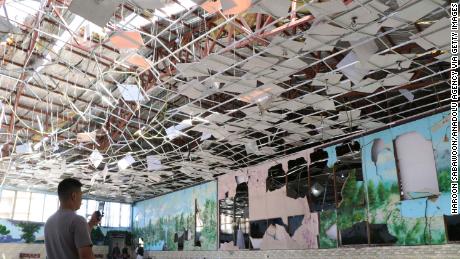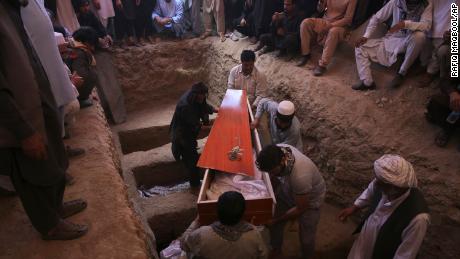
What a wedding massacre says about Trump’s plan to leave Afghanistan
Officials say at least 63 died — the bride and groom survived — but relatives think the death toll m..
Officials say at least 63 died — the bride and groom survived — but relatives think the death toll may be higher. Violent death is an everyday occurrence in Kabul, but this attack shocked many with its sheer savagery. "Before the blast we were so happy, all our family, relatives and friends were at the hall and we were enjoying the wedding," Basir Jan, a brother of the groom, told CNN. "When the blast happened, I saw dead bodies of my relatives and friends. Eight of my close friends were killed in the blast. It was a scene I will always remember."The devastation represents a personal tragedy the families who were targeted in Kabul at the weekend. But it also provided a bloody backdrop to the final stages of peace talks being held now between the Taliban and the United States. The US top negotiator, Special Representative Zalmay Khalilzad, tweeted shortly after the bomber walked into the celebration: "We must accelerate the #AfghanPeaceProcess including intra-Afghan negotiations. Success here will put Afghans in a much stronger position to defeat ISIS."It's a tweet that manages to be both startlingly opportunistic, flawed but largely accurate at the same time. Accurate, since a peace deal between the US and Taliban would enable both to focus on ISIS — a comparatively tiny, yet brutal part of the insurgency raging in Afghanistan now. Flawed, because a peace deal would not guarantee the Taliban didn't pursue its main enemy, the Afghan government first, before getting around to ISIS. Opportunistic, as the tweet also exposed the "deal at all costs" attitude behind the talks now: The massacre is a reflection of how badly Afghanistan has collapsed, not of how well the proposed peace deal might fix it. Trump wants out of Afghanistan, that much is clear, despite saying last year he would win. But how much of an inglorious an end to America's longest war is he prepared to countenance to make that happen?To recap. Some months ago the United States made a key concession with the Taliban, agreeing to direct talks that excluded the Afghan government from the table — something the insurgents always wanted.Sources close to the talks say they are 99% resolved around a deal between the US and the Taliban that would involve a reduction in American troops, and more importantly a ceasefire between these two combatants.That ceasefire would not necessarily bring an end to fighting between the Taliban and Afghan government forces — only remove the US's airpower from the battlefield. The Taliban and Afghan government would then begin separate peace talks, the sources say. Afghan critics of the plan worry that as those peace talks inevitably stumble, Kabul government would begin to lose territory to the Taliban, abandoned by Washington and with American firepower sitting idly by.
The US top negotiator, Special Representative Zalmay Khalilzad, tweeted shortly after the bomber walked into the celebration: "We must accelerate the #AfghanPeaceProcess including intra-Afghan negotiations. Success here will put Afghans in a much stronger position to defeat ISIS."It's a tweet that manages to be both startlingly opportunistic, flawed but largely accurate at the same time. Accurate, since a peace deal between the US and Taliban would enable both to focus on ISIS — a comparatively tiny, yet brutal part of the insurgency raging in Afghanistan now. Flawed, because a peace deal would not guarantee the Taliban didn't pursue its main enemy, the Afghan government first, before getting around to ISIS. Opportunistic, as the tweet also exposed the "deal at all costs" attitude behind the talks now: The massacre is a reflection of how badly Afghanistan has collapsed, not of how well the proposed peace deal might fix it. Trump wants out of Afghanistan, that much is clear, despite saying last year he would win. But how much of an inglorious an end to America's longest war is he prepared to countenance to make that happen?To recap. Some months ago the United States made a key concession with the Taliban, agreeing to direct talks that excluded the Afghan government from the table — something the insurgents always wanted.Sources close to the talks say they are 99% resolved around a deal between the US and the Taliban that would involve a reduction in American troops, and more importantly a ceasefire between these two combatants.That ceasefire would not necessarily bring an end to fighting between the Taliban and Afghan government forces — only remove the US's airpower from the battlefield. The Taliban and Afghan government would then begin separate peace talks, the sources say. Afghan critics of the plan worry that as those peace talks inevitably stumble, Kabul government would begin to lose territory to the Taliban, abandoned by Washington and with American firepower sitting idly by. The counter-narrative to this bleak assessment is threefold. First, the Taliban knows it must join forces with an internationally recognised government in order to qualify for foreign aid, so a return to the atavism of the 1990s is unlikely. Also, the US must eventually leave Afghanistan one way or another, or at least reduce its expenditure there. And finally that violence has rocketed these talks progress — both sides trying to assert dominance on the battlefield — and that peace and a reduction of violence has to be the only priority.This conclusion is valid, yet misses one point — the reason why the United States went into Afghanistan in the first place. Al-Qaeda hasn't vanished. In fact, when the longtime Taliban leaderRead More – Source
The counter-narrative to this bleak assessment is threefold. First, the Taliban knows it must join forces with an internationally recognised government in order to qualify for foreign aid, so a return to the atavism of the 1990s is unlikely. Also, the US must eventually leave Afghanistan one way or another, or at least reduce its expenditure there. And finally that violence has rocketed these talks progress — both sides trying to assert dominance on the battlefield — and that peace and a reduction of violence has to be the only priority.This conclusion is valid, yet misses one point — the reason why the United States went into Afghanistan in the first place. Al-Qaeda hasn't vanished. In fact, when the longtime Taliban leaderRead More – Source

